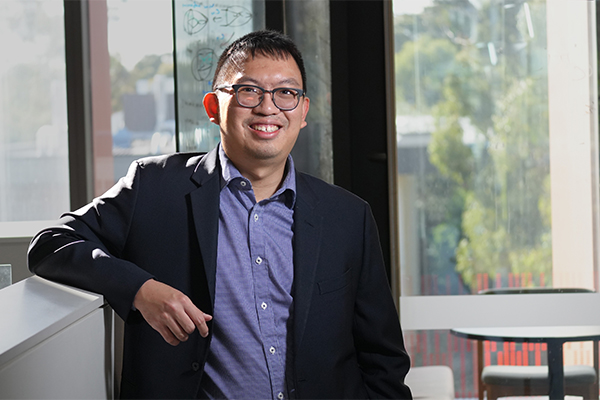Can Artificial Intelligence Generate Meaningful Scientific Hypotheses?

Our Liverpool Virtual Seminar Series on Data Intensive Science will continue on Tuesday 9th January 2024 at 3pm GMT. The seminar will be given by Dr Yuan-Sen Ting, an Associate Professor at the Australian National University, who will present “Can Artificial Intelligence Generate Meaningful Scientific Hypotheses?”
Seminars in this series cover R&D outside of the data intensive science CDT’s core research areas and give an insight into cutting edge research in this area. At the end of the talk there will be a Q&A session with the speaker.
About the talk
In recent years, AI, notably through advancements in Large Language Models (LLMs) such as ChatGPT, has garnered significant attention both within academia and the broader public sphere. However, these general-purpose LLMs have been criticized for their tendency to produce spurious or 'hallucinated' information when grappling with specialized or technical domains. To address this limitation, we introduce the UniverseTBD Consortium—an international collaboration, comprising a diverse team of 30 active contributors from computer science and astronomy. Our mission is to democratize the field of astronomy by developing public-facing, AI-driven large language model tools specialized for this discipline. Our research presents the first astronomy-centric LLM, AstroLLaMa, that can produce text completion and embedding that outperform GPT models. We also show that LLMs can generate scientific hypotheses of a complexity comparable to those produced by human experts through techniques such as in-context prompting and fine-tuning on domain-specific literature. Moreover, we posit that these specialized foundational models can revolutionize the methods we employ for literature searches and the tracing of intellectual developments within the field. We argue that the domain of physical sciences, particularly astronomy, serves as an ideal test bed for investigating the potential of modern LLMs. This inquiry stands to fundamentally reshape our understanding of both artificial and human intelligence and the boundaries of accumulated knowledge.
About the speaker
Dr Yuan-Sen Ting serves as an Associate Professor at the Australian National University, where he contributes to both the astronomy and computer science departments. He also holds an Associate Professorship in astronomy at The Ohio State University. His research primarily centres on employing machine learning to enhance statistical methods, especially when working with extensive astronomical datasets.
A native of Malaysia, Dr Ting completed his Bachelor's and Master's degrees from the National University of Singapore and École Polytechnique in France, supported by the Eiffel scholarship. During this time, he was acknowledged with the Institute for Physics Medal and the National Academy of Science Award in Singapore. In 2017, under a NASA Earth and Space Science Fellowship, he obtained his PhD in astronomy and astrophysics from Harvard University. His postdoctoral experiences spanned the first four-way fellowship involving institutions, including Institute for Advanced Study at Princeton, Princeton University, the Carnegie Institution for Science, and NASA Hubble Fellowship.
His efforts in integrating AI with science have been recognized, leading to him being named a "Future Leader" by the Association of Universities for Research in Astronomy and being a recipient of the CCAPP Price Prize. Recently, the Australian Research Council DECRA fellowship was conferred upon him after his association with the Australian National University.
In addition to his research endeavours, Dr Ting co-chairs the NASA Cosmic Programs Stars Science Interest Group and the IEEE “Deep Vision in Space” Task Force. He also spearheaded the organization of the inaugural two major astronomy conferences and a summer school in Malaysia in 2023. As working group leaders, he has been instrumental in shaping future spectroscopic studies, including the MUST and FOBOS surveys. Dr Ting is deeply committed to community engagement: he pens regular articles for a prominent Chinese newspaper in Malaysia, with more than a million readership, and has contributed to educational platforms, most notably through two TED-Ed videos which have collectively garnered over four million views and recently gave a TEDx talk in Malaysia. Beyond academia, he has applied his machine learning expertise in the arts, having served as a chief science officer on a project aimed at detecting art forgeries. On a lighter note, Dr Ting once made a mark in the gaming community as a leading Night-Elf player in Warcraft 3 in Malaysia.
How to attend
Participation is free, but you need to register to attend this and other webinars in the series. For more information and how to register please follow this link. Once registered, you will receive the Zoom connection details on the morning of the online seminar.
The seminar details
Speaker: Dr Yuan-Sen Ting, (Australian National University)
Seminar title: “Can Artificial Intelligence Generate Meaningful Scientific Hypotheses?”
Date/Time: Tuesday 9th January at 3pm GMT